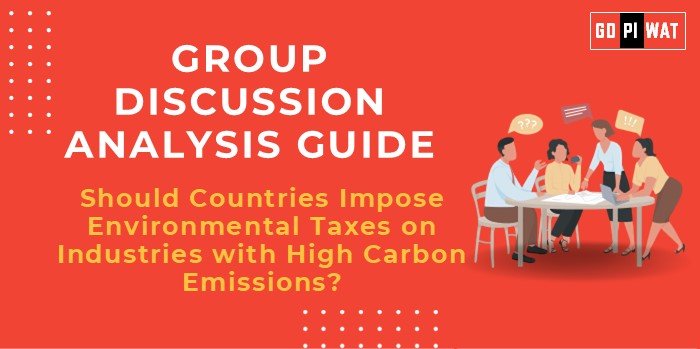🌱 Group Discussion Analysis Guide
💡 Should Countries Impose Environmental Taxes on Industries with High Carbon Emissions?
📖 Introduction to the Topic
Opening Context: With the global emphasis on sustainable development and the need to combat climate change, environmental taxes are increasingly being debated as a policy tool to curb carbon emissions.
Background: Environmental taxes, or carbon taxes, aim to make polluters bear the cost of the damage caused by greenhouse gases. Nations like Sweden and Canada have successfully implemented carbon taxes, but their adoption varies worldwide due to economic and political complexities.
📊 Quick Facts and Key Statistics
- 🌍 Global Carbon Emissions (2023): 33 billion tons annually, with industries contributing over 40%.
- 🇸🇪 Sweden’s Carbon Tax Success: Reduced emissions by 25% since 1991 while growing GDP by 78%.
- 🇮🇳 India’s CO2 Emissions Share: The industrial sector accounts for 25%, rising with development.
- 📈 Carbon Pricing Coverage: Over 25 countries have implemented carbon pricing mechanisms, affecting 23% of global emissions.
👥 Stakeholders and Their Roles
- Governments: Implement and enforce environmental taxes; allocate revenues for green initiatives.
- Industries: Adapt to taxation by innovating and reducing emissions.
- Consumers: Bear indirect costs but benefit from cleaner environments.
- International Bodies: Provide frameworks, funding, and guidelines (e.g., UNFCCC, World Bank).
🏆 Achievements and Challenges
🌟 Achievements:
- Sweden’s emissions reduction with economic growth as a benchmark for success.
- Revenue reinvestment in renewable energy and public infrastructure in Canada.
- Encouraged innovations like carbon capture technologies in heavy industries.
⚠️ Challenges:
- Potential economic slowdown in developing nations reliant on industrial growth.
- Public resistance due to increased costs of goods and services.
- Risk of carbon leakage where industries relocate to non-tax regions.
🌍 Global Comparisons:
- Sweden: High carbon tax with public support.
- Australia: Carbon tax repealed in 2014 due to economic backlash.
📖 Case Study:
India’s Clean Energy Cess: Imposed on coal, raising significant funds for renewable projects.
💬 Structured Arguments for Discussion
✅ Supporting Stance:
“Environmental taxes internalize the cost of emissions, incentivizing industries to adopt cleaner technologies and align with global climate goals.”
❌ Opposing Stance:
“Imposing such taxes risks economic slowdown, especially in developing nations, and disproportionately affects low-income populations.”
⚖️ Balanced Perspective:
“While environmental taxes are effective in curbing emissions, they must be paired with subsidies for green technologies to balance economic impacts.”
🎯 Effective Discussion Approaches
🚀 Opening Approaches:
- “With industries contributing 40% to global carbon emissions, should nations prioritize economic growth or environmental responsibility?”
- “Sweden’s carbon tax success showcases how economic development can align with environmental sustainability.”
🤝 Counter-Argument Handling:
- “Though there are concerns about economic impacts, revenue from environmental taxes can be recycled to subsidize industries transitioning to green practices.”
🔍 Strategic Analysis of Strengths and Weaknesses
- Strengths: Revenue generation for green projects, innovation boost, global leadership in sustainability.
- Weaknesses: High implementation costs, potential economic inequalities.
- Opportunities: Global carbon markets, public-private partnerships in sustainability.
- Threats: Carbon leakage, political resistance.
📚 Connecting with B-School Applications
🌟 Real-World Applications:
Discuss project themes like corporate sustainability, policy analysis, or green technology investments.
📄 Sample Interview Questions:
- “How can carbon taxes balance environmental and economic interests?”
- “Should developing nations prioritize environmental taxes over industrial growth?”
📘 Insights for Students:
- Focus on sustainable finance and carbon markets for internships or research.
- Explore case studies of successful carbon taxation policies.


